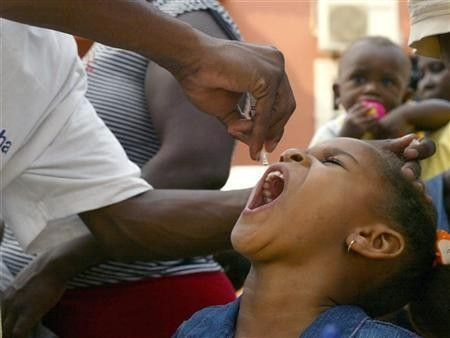The Last Frontier For Polio: Militants Fighting Medicine In Nigeria

Poliomyelitis is a potentially debilitating disease that mostly affects children under 5 years old; it is easily spread, works quickly, can cause paralysis or death and has no cure.
But polio can be prevented quite easily. The vaccine for the disease is taken orally, and those who administer it do not require extensive medical training. According to the Switzerland-based Polio Eradication Initiative, the cost of a single vaccination dose in developing countries can be less than 15 cents. That’s why polio has been essentially wiped out in nearly every country on Earth -- infections worldwide have been reduced by 99 percent over the last 25 years.
There are only three holdouts: Afghanistan, Pakistan and Nigeria. Of those three, Nigeria suffers the most instances: 121 recorded cases in 2012. And a tragic incident on Friday reveals just why children there are still falling victim to an easily preventable scourge.
In Kano, the largest city in northern Nigeria, assailants descended on two clinics where polio vaccines are administered. At least nine female health workers were shot dead.
No one has yet claimed responsibility for the act, but suspicion has fallen heavily on a group called Boko Haram, an Islamist terrorist organization that was founded in 2002 and has killed more than 1,000 people since it accelerated military activities three years ago. The group aims to establish a harsh version of Shariah, or Islamic law, across northern Nigeria, where most citizens practice a more moderate form of Islam.
Boko Haram’s activities have worsened a long-standing schism between northern Nigeria, which is relatively sparsely populated and mostly Muslim, and southern Nigeria, which is more well-developed and predominantly Christian.
A deep-seated suspicion of Western influence among the more extreme Islamists in northern Nigeria -- Boko Haram included -- has generated opposition to the life-saving polio vaccine. Clerics have warned that the vaccines contained ingredients that could hurt fertility or even spread HIV/AIDS. The phenomenon goes back several years.
Datti Ahmed, head of the Supreme Council for Shariah in Nigeria who was briefly designated a mediator between the government and Boko Haram militants last year, said in 2003 that the polio vaccines were “corrupted and tainted by evil-doers from America and their Western allies,” according to the Associated Press.
Back then, this sentiment was shared by northern government officials as well -- the vaccine was actually banned in Kano for about a year from 2003-04.
“Since Sept. 11, the Muslim world ... is beginning to be suspicious of any move from the Western world. Our people have become really concerned about the polio vaccine,” Sule Ya'u Sule, a spokesman for the governor of Kano, said in 2004.
Since then, most government authorities have come around to accept vaccination programs, at least outwardly. But Friday’s incident makes it clear that stubborn pockets of resistance still remain.
Militants’ violent disruptions of vital health care services are widely -- and rightly -- condemned, but it is worth noting that some of their suspicions are based on a tiny shred of truth: Western authorities have used vaccines as a ruse in the past.
In the spring of 2011, CIA officials kicked off a program in Abbottabad, Pakistan, wherein Pakistani medical officials administered vaccines for hepatitis B. That procedure requires an intravenous injection, and U.S. officials were hoping to collect DNA samples that would lead them to Osama bin Laden. The CIA admitted to the program in 2012; it did not seem to have greatly helped their intelligence-gathering efforts, though bin Laden was killed shortly after the vaccinations began.
That program had the unfortunate side effect of raising suspicions about Western-backed health care initiatives in foreign countries. So it is perhaps no surprise that northern Nigeria is not the only place where anti-vaccination militants have perpetrated violence -- last December, at least nine health workers involved in the administration of polio vaccines were killed in a string of attacks carried out by unknown militants in Pakistan. Two more were killed there by a roadside bomb in late January.
Over the last quarter-century, medicinal science has made great strides against polio. But the fight, now in its final stretches, has entered a new phase -- one that is based on public attitudes, awareness and health care professionals’ dogged determination to continue their work even in areas of great risk.
The women who died in Nigeria on Friday were volunteers taking part in a local polio drive. Even more tragically, their deaths may result in the unnecessary infection of children in Kano. But Nigerian officials vow to keep up with their important work, which has already accomplished so much and has great potential to eventually beat the disease once and for all.
© Copyright IBTimes 2024. All rights reserved.






















